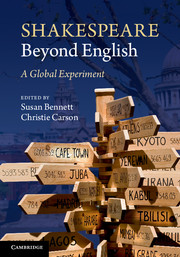Book contents
- Frontmatter
- Contents
- List of Illustrations
- List of colour plates
- Notes on contributors
- Foreword
- Acknowledgements
- Introduction
- The Globe to Globe Festival: An Introduction
- Performance Calendar
- Week One
- Chapter One U Venas no Adonisi
- Chapter Two Festival showcasing and cultural regeneration
- Chapter Three ‘What's mine is yours, and what is yours is mine’
- Chapter Four ‘The girl defies’
- Chapter Five Pericles and the Globe
- Chapter Six Technicolour Twelfth Night
- Week Two
- Week Three
- Week Four
- Week Five
- Week Six
- Afterwords
- Index
- Plate section
- References
Chapter Six - Technicolour Twelfth Night
Published online by Cambridge University Press: 05 June 2014
- Frontmatter
- Contents
- List of Illustrations
- List of colour plates
- Notes on contributors
- Foreword
- Acknowledgements
- Introduction
- The Globe to Globe Festival: An Introduction
- Performance Calendar
- Week One
- Chapter One U Venas no Adonisi
- Chapter Two Festival showcasing and cultural regeneration
- Chapter Three ‘What's mine is yours, and what is yours is mine’
- Chapter Four ‘The girl defies’
- Chapter Five Pericles and the Globe
- Chapter Six Technicolour Twelfth Night
- Week Two
- Week Three
- Week Four
- Week Five
- Week Six
- Afterwords
- Index
- Plate section
- References
Summary
The Company Theatre of Mumbai's all-singing, all-dancing Hindi Twelfth Night turned Shakespeare's comedy into a technicolour romp. Whereas recent British Twelfth Nights have tended to be angsty, lugubrious, Shakespeare-as-Chekhov, with Malvolio needing to get in touch with Amnesty International, this production offered a cheekily filleted version of the play, cut radically to fit the two-hours running time stipulated by the Globe. Physicality, energy and verve were the keynotes as Twelfth Night was given a bold Bollywood make-over (see Colour Plate 3).
Director Atul Kumar's remixed Twelfth Night was bright and breezy but often worked in tension with the Globe's theatre-in-the-round element; the presentational, Bollywood smile-at-the-camera playing style was essentially end-on, and the production pushed the action further down stage by using an upstage ‘offstage’ area, demarcated by a large, rectangular carpet. Here the musicians sat and here the actors gathered to watch any action they were not involved in, often applauding and calling out encouragement to each other. This onstage ‘offstage’ worked well with the production's enthusiastic show-and-tell approach that acknowledged and played to the audience, especially the groundling groupies with their elbows parked on the front of the stage. But anyone who was not end-on to the action risked missing much of the fun.
- Type
- Chapter
- Information
- Shakespeare beyond EnglishA Global Experiment, pp. 68 - 72Publisher: Cambridge University PressPrint publication year: 2013
References
- 1
- Cited by



